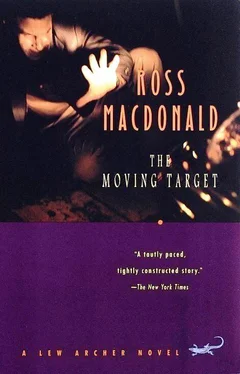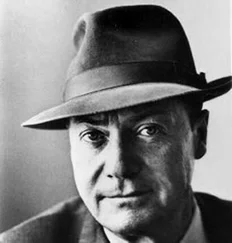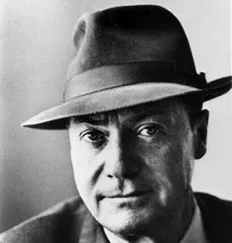A fresh offshore breeze was driving in the waves and blowing off their crests in spray before they broke. The morning sun was hot on my back, the dry sand warm against the soles of my feet. I stood for a minute in the zone of wet brown sand just above the reach of the waves and looked at them. The waves were blue and sparkling, curved as gracefully as women, but I was afraid of them. The sea was cold and dangerous. It held dead men.
I waded in slowly, pulled the mask down over my face, and pushed off. About fifty yards from shore, beyond the surf, I turned on my back and breathed deeply through my mouth. The rise and fall of the swells, and the extra oxygen, made me a little dizzy. Through the misted glass the blue sky seemed to be spinning over my head. I ducked under water to clear the glass, surface-dived, and breast-stroked to the bottom.
It was pure white sand broken by long brown ribs of stone. The sand was roiled a little by the movement of the water, but not enough to spoil the visibility. I zigzagged forty or fifty feet along the bottom and found nothing but a couple of undersized abalones clinging to a rock. I kicked off and went to the surface for air.
When I raised the mask I saw that a man was watching me from the cliff. He ducked down behind the wild-cherry windbreak by the pergola, but not before I had recognized Taggert. I took several deep breaths and dived again. When I came up, Taggert had disappeared.
On the third dive I found what I was looking for, an unbroken black disk half buried in the sand on the bottom. Holding the record against my chest, I turned on my back and kicked myself to shore. I took it into the shower and washed and dried it with tender care, like a mother with an infant.
Taggert was on the veranda when I came out of the dressing-rooms. He was sitting in a canvas chair with his back to the screen door. In flannel slacks and a white T-shirt, he looked very young and brown. The black hair on his small head was carefully brushed.
He gave me a boyish grin that didn’t touch his eyes. “Hello there, Archer. Have a nice swim?”
“Not bad. The water’s a little cold.”
“You should have used the pool. It’s always warmer.”
“I prefer the ocean. You never know what you’re going to find. I found this.”
He looked at the record in my hands as if he was noticing it for the first time. “What is it?”
“A record. Somebody seems to have scraped the labels off and thrown it in the sea. I wonder why.”
He took a step toward me, long and noiseless on the grass rug. “Let me see.”
“Don’t touch it. You might break it.”
“I won’t break it.”
He reached for it. I jerked it out of his reach. His hand grasped air.
“Stand back,” I said.
“Give it to me, Archer.”
“I don’t think so.”
“I’ll take it away from you.”
“Don’t do that,” I said. “I think I can break you in two.”
He stood and looked at me for ten long seconds. Then he turned on the grin again. The boyish charm was very slow in coming. “I was just kidding, man. But I’d still like to know what’s on the bloody thing.”
“So would I.”
“Let’s play it then. There’s a portable player here.” He moved around me to the table in the center of the veranda and opened a square fiber box.
“I’ll play it,” I said.
“That’s right – you’re afraid I’ll break it.” He went back to his chair and sat down, stretching his legs in front of him.
I cranked the machine and placed the record on the turntable. Taggert was smiling expectantly. I stood and watched him, waiting for a sign, a wrong move. The handsome boy didn’t fit into the system of fears I had. He didn’t fit into any pattern I knew.
The record was scratched and tired. A single piano began to beat, half drowned in surface noise. Three or four hackneyed boogie chords were laid down and repeated. Then the right hand wove through them, twisting them alive. The first chords multiplied and built themselves around the room. The place they made was half jungle, half machine. The right hand moved across it and back again like something being chased. Chased through an artificial jungle by the shadow of a giant.
“You like it?” Taggert said.
“Within limits. If the piano was a percussion instrument it would be first-rate.”
“But that’s just the point. It is a percussion instrument if you want to use it that way.”
The record ended, and I turned it off. “You seem to be interested in boogie-woogie. You wouldn’t know who made this record?”
“I wouldn’t, no. The style could be Lux Lewis.”
“I doubt it. It sounds more like a woman’s playing.”
He frowned in elaborate concentration. His eyes were small in his head. “I don’t know of any woman who can play like that.”
“I know of one. I heard her in the Wild Piano night before last. Betty Fraley.”
“I never heard of her,” he said.
“Come off it, Taggert. This is one of her records.”
“Is it?”
“You should know. You tossed it in the sea. Now why would you do that?”
“The question doesn’t arise, because I didn’t do it. I wouldn’t dream of throwing good records away.”
“I think you dream a great deal, Taggert. I think you’ve been dreaming about a hundred thousand dollars.”
He shifted slightly in his chair. His stretched-out pose had stiffened and lost its air of casualness. If someone had lifted him by the nape of the neck, his legs would have stayed as they were, straight out before him in the air.
“Are you suggesting that I kidnapped Sampson?”
“Not personally. I’m suggesting that you conspired to do it – with Betty Fraley and her brother Eddie Lassiter.”
“I never heard of them, either of them.” He drew a deep breath.
“You will. You’ll meet one of them in court, and hear about the other.”
“Now just a minute,” he said. “You’re going too fast for me. Is this because I threw those records away?”
“This is your record, then?”
“Sure.” His voice was vibrantly frank. “I admit I had some of Betty Fraley’s records. I got rid of them last night when I heard you talking to the police about the Wild Piano.”
“You also listen to other people’s telephone conversations?”
“It was purely accidental. I overheard you when I was trying to make a phone call of my own.”
“To Betty Fraley?”
“I told you I don’t know her.”
“Excuse me,” I said. “I thought perhaps you phoned her last night to give her the green light on the murder.”
“The murder?”
“The murder of Eddie Lassiter. You don’t have to act so surprised, Taggert.”
“But I don’t know anything about these people.”
“You knew enough to throw away Betty’s records.”
“I’d heard of her, that’s all. I knew she played at the Wild Piano. When I heard the police were interested in the place, I got rid of her records. You know how unreasonable they can be about circumstantial evidence.”
“Don’t try to kid me the way you’ve kidded yourself,” I said. “An innocent man would never have thought of throwing those records away. People all over the country have them, haven’t they?”
“That’s just my point. There’s nothing incriminating about them.”
“But you thought there was, Taggert. You’d have had no reason to think of them as evidence against you, if you really weren’t in this thing with Betty Fraley. And it happens that you threw them in the sea a good many hours before you heard my phone call – before Betty was ever mentioned in connection with this case.”
“Maybe I did,” he said. “But you’re going to have a time hanging anything on me on the basis of those records.”
Читать дальше












